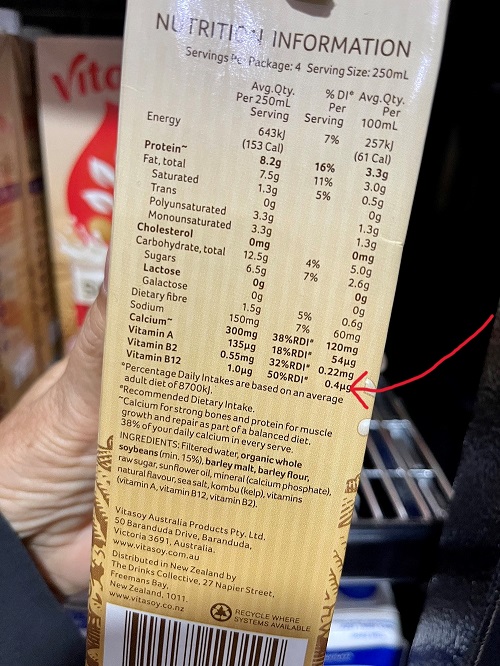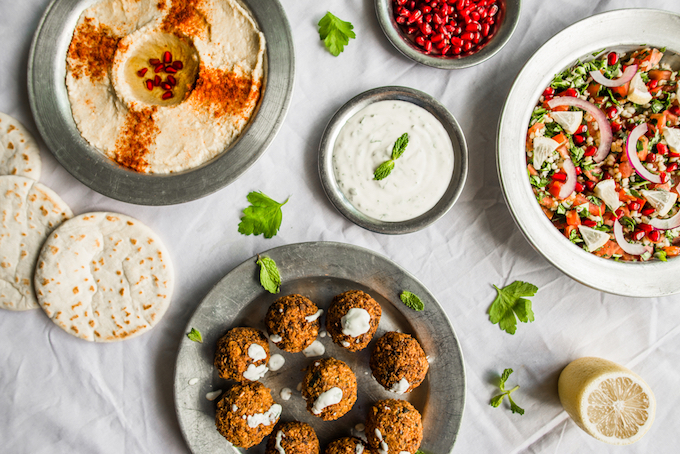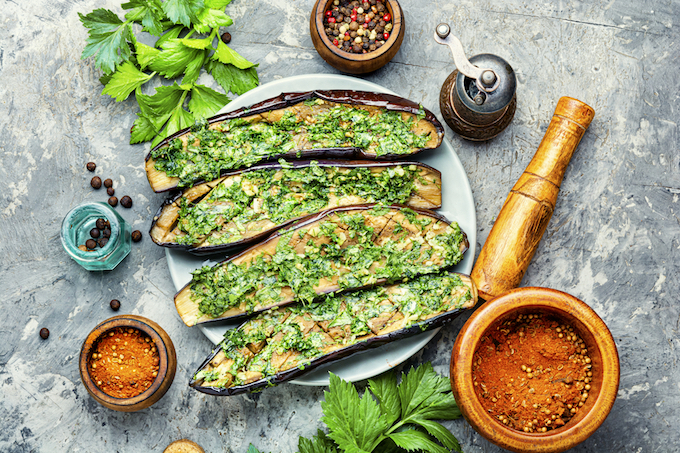- Home
- Blog
- Healthy Eating for Wellness
- How to be a healthy vegan – 5 nutrients you need
How to be a healthy vegan – 5 nutrients you need
Written by Catherine Saxelby
on Wednesday, 15 April 2020.
Tagged: health, healthy cooking, healthy eating, healthy lifestyle, nutrition, vegan

Vegan eating (aka plant-based eating) is popular at the moment and many take it up for ethical reasons such as a concern for the welfare of the planet or reducing the cruelty to animals who are slaughtered for the benefit of humans. However, if you're going to choose a vegan lifestyle you can't just 'wing-it'. You need to make sure that you're eating a balanced diet and this isn't as easy when you remove so many nutritious foods from the menu. I'm here to help you eat vegan and stay healthy!
While only 2 or 3 per cent of the population are vegan, many are now eating more meals devoid of meat, fish or dairy – just witness the huge rise in Meat-free Monday and Veganuary. What’s more many restaurants now offer a wider range of meat-free menu choices such as mushrooms and cheese with fettucine or tomato-basil-feta salad, which is great to see.
Vegan pitfalls — the 5 nutrients likely to be in short supply
Here are the 5 nutrients likely to be deficient in a vegan diet:
1. Vitamin B12
 Strict vegan diets lack Vitamin B12, which is found only in animal foods. Although needed in minute quantities, vitamin B12 is essential for healthy red blood cells, DNA genetic material and nerve tissues. Lack of it can bring on pernicious anaemia and degeneration of the nervous system. However, because vitamin B12 is stored in the liver, it takes 3 to 5 years for a healthy adult vegan to develop any deficiency.
Strict vegan diets lack Vitamin B12, which is found only in animal foods. Although needed in minute quantities, vitamin B12 is essential for healthy red blood cells, DNA genetic material and nerve tissues. Lack of it can bring on pernicious anaemia and degeneration of the nervous system. However, because vitamin B12 is stored in the liver, it takes 3 to 5 years for a healthy adult vegan to develop any deficiency.
While rare, B12 deficiency has been reported in babies of vegan mothers, where it has caused impaired mental functioning. The demands of pregnancy and breastfeeding soon deplete the mother’s B12 stores and leave her milk without sufficient B12.
Pregnant and breastfeeding vegan women should therefore make sure that any plant mylks they drink are fortified with B12 or else take a B12 supplement (2 micrograms a day is recommended; supplements contain 2–100 micrograms).
Vegan B12 sources: fortified plant mylks, mushrooms, fortified nutritional yeast sprinkle.
2. Iron
Anaemia caused by iron deficiency is one of the most common nutrition problems for vegans, especially women. Due to the presence of phytates and oxalates, less than 5 per cent of the iron in plant foods is absorbed by our bodies, compared to 20 per cent or more of the iron found in red meat. Plant iron also occurs in an inorganic form as non-haem iron compared to meat’s haem iron which is easier to absorb.
Vegan iron sources: iron-fortified breakfast cereals, dark green vegetables (spinach, silverbeet, broccoli), beans, lentils, meat substitutes like tofu, quorn or soy steaks, dried fruit and cocoa powder.
Vegan meals are typically high in vitamin C (like capsicum, tomatoes, orange juice or a squeeze of lemon), which greatly boosts the absorption of non-haem iron.
3. Calcium
Calcium is critical for growing children and pregnant women. Deficiency causes stunted growth (think of rickets caused by lack of vitamin D, a vitamin also found in full-fat milk) and malformed bones and teeth. Vegans avoid most dairy products and need non-dairy calcium.

Vegan calcium sources: plant mylks fortified with calcium (look for 120 milligrams per 100 millilitres or more), green leafy vegetables with low phytate (kale, Asian greens), tahini (sesame seed paste), almonds, Brazil nuts, hazelnuts, tofu, dried figs.
4. Zinc
Zinc is vital for the function of many enzymes in the body and for a strong immune system. The richest sources are animal foods such as oysters, fish, meat and chicken. Zinc from these foods is better absorbed than from plant foods.
Vegan zinc sources: wholemeal and grain breads, bran and wholegrain breakfast cereals, legumes, nuts.
5. Omega-3 fats
Vegans miss out on the valuable omega-3 fats from oily fish and grass-fed meats.
Vegan omega-3 sources: linseeds (flaxseeds), linseed oil, hemp seeds, hemp oil, omega-3 enriched products (such as spread or bread), walnuts, pecans, soy beans, leafy vegetables like rocket and spinach. Algal capsules (derived from plankton) instead of fish oil capsules.
However, to be used in the body, the vegan form must be converted to the long-chain form, a process that’s not efficient, with only around 10 per cent conversion.

The bottom line
A vegan diet is fine if you’re a healthy adult if you’re not showing any signs of deficiency. However, it’s unwise to make your babies or toddlers follow a strict one exclusively. They need these five nutrients to survive and thrive – there have been court cases showing that a strict vegan diet is severely deficient in nutrients required for toddlers to grow and develop.
Protein is not a problem and can be easily obtained from beans, chickpeas, lentils, tofu, grains and nuts. If parents pursue a vegan diet for their child, they must follow medical and dietary advice. The greatest hazard is vitamin B12 deficiency which can have devastating effects on their child’s blood, brain and nervous system.
Whilst I recognise that well-planned vegan diets can support healthy living in all ages, the growing years are not the time to experiment. Find a friend who keeps chickens in their yard and will supply you with weekly eggs or buy them from a farmers’ market so you know the animals are well looked after.
Foodwatch
The Good Stuff
The Boring Stuff
© 2025 Foodwatch Australia. All rights reserved
Website by Joomstore eCommerce





